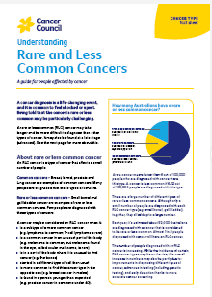- Home
- Rare and less common (RLC) cancers
- Diagnosis
Rare and less common cancer diagnosis
The process of diagnosing a rare or less common cancer may be quite different to that of diagnosing a common cancer. It may take longer to get an exact diagnosis, and involve more doctors and tests.
Learn more about:
- Why is it more difficult to diagnose an RLC cancer?
- Tests you may have
- Waiting for test results
- Molecular and genetic testing
Why is it more difficult to diagnose an RLC cancer?
An RLC cancer type may be more difficult to diagnose because:
- Some RLC cancers have symptoms that are less well known compared with the symptoms of more common cancers.
- Symptoms may be similar to some common conditions. And these conditions are usually ruled out first, before a rare cancer is investigated.
- Sometimes cancer develops in a person who is not expected to get cancer (e.g. due to their age or sex). This can lead to delays in looking for cancer.
- Several tests may be needed, or more than one specialist involved, before getting a diagnosis.
- Another diagnosis, or general cancer diagnosis may be made first, before the final diagnosis is confirmed (e.g. an initial finding of breast cancer, before a final diagnosis of metastatic triple negative breast cancer).
- The pathologist may need to do a number of specialised tests on your tissue or blood sample, or they may have to send the sample to a specialist laboratory for testing.
Challenges in diagnosing an RLC cancer may mean it is found at a later stage. See Living with advanced cancer for more information.
The length of time it takes to accurately diagnose an RLC cancer can be upsetting and frustrating. You may also have tests to see if the cancer is hereditary, which can be worrying and stressful for your family. For help with this see Coping with a rare or less common cancer diagnosis.
Tests you may have
To find out what type of cancer you have, you may need several tests to look for the cause of your symptoms. Doctors will use the results of these tests to help work out the type of cancer you have and the best treatment for you.
Some specialised tests, including blood tests, may not be covered by Medicare or health insurance. Ask about the cost when booking or having these tests.
| Physical examination | Your doctor may listen to your heart and lungs, look into your mouth or eyes, or feel your body to check for lumps, enlarged organs or other signs of cancer. |
| Scans and scopes | Tests might include an ultrasound and scans such as a CT (computerised tomography), a PET (positron emission tomography) or an MRI (magnetic resonance imaging). Tests could also include an endoscopic examination, which allows doctors to see inside your body using a small camera. |
| Blood tests | You will usually have blood tests to measure your white blood cells, red blood cells and platelets, and check how well your kidneys and liver are working. Blood tests can also look for infection and tumour markers (proteins produced by cancer cells). Urine tests may also check organ function or other markers. |
| Biopsy | To diagnose many cancers, a doctor may need to remove a sample of tissue from the affected area. The cells are then examined under a microscope by a specialist doctor called a pathologist. This is called a biopsy. The type of biopsy you have will depend on your symptoms and which part of the body is being checked. |
Waiting for test results
Be prepared for results to take timeIt may take days, a couple of weeks, or even longer to get your test results. This can be an anxious time. You may feel like the future feels very uncertain, that something serious might be found, or that you have no control over what is happening to you. You may feel like you keep having tests and not getting any answers. | |
Try to focus on other thingsThere is no right or wrong way to deal with the anxiety of waiting. Some people find it helpful to keep doing their usual activities, such as going to work, as this is a good distraction from worrying about the test results. But others may find it hard to concentrate on anything else. | |
Let others know how you are feelingWhile you are waiting, it might help to talk to a close friend or relative about how you feel. You can also call Cancer Council 13 11 20, where experienced health professionals can listen to your concerns, answer questions about cancer, and provide you with helpful resources and links to support services. |
→ READ MORE: Molecular and genetic testing for RLC cancers
Being diagnosed with a rare cancer can make you feel totally isolated. When I began my treatment, I started meeting people who had also been diagnosed with a rare or less common cancer. I soon began to realise that although my cancer was rare, I wasn’t alone.
Nicole
Podcast: Tests and Cancer
Listen to more episodes of our podcast for people affected by cancer
More resources
Dr Damien Kee, Medical Oncologist, Austin Health and Peter MacCallum Cancer Centre, and Clinical Research Fellow, Walter and Eliza Hall Institute, VIC; Emeritus Professor Phyllis Butow, Psychologist, The University of Sydney, NSW; Alison Danis, Consumer; Dr Michelle Harrison, Medical Oncologist, Chris O’Brien Lifehouse, NSW; Jess Pike, Senior Social Worker, Westmead Hospital, NSW; Trish Taylor, Consumer; Lesley Woods, 13 11 20 Consultant, Cancer Council WA.
View the Cancer Council NSW editorial policy.

